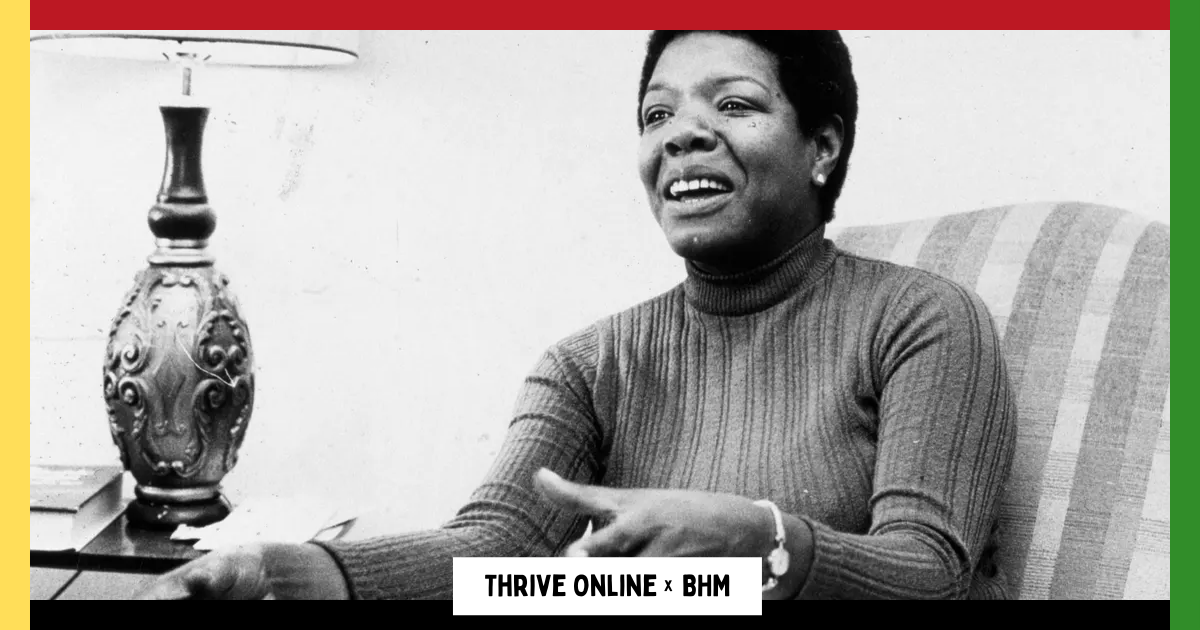Black Excellence Book Review: "I Know Why The Caged Bird Sings"
 Written by: Shaowda Salehin, 4th Year English + Biology
Written by: Shaowda Salehin, 4th Year English + Biology
Photo from: The Guardian
I read “I Know Why the Caged Bird Sings” (1969) when I was about 17 with my grade 11 English class - it was the very first time every single student remained silent and observant during each lesson. The novel is a remarkable account on the transition of Black adolescence, from childhood to adulthood. Maya Angelou’s auto-biographical work is iridescent of the pivotal moments shared in the Black American female experience and a true testament of endurance and courage.
Maya and her brother Bailey travel across the south to stay with their Grandmother in Stamps, Arkansas, where they are subject to racism and injustice by the white community. Maya internalizes the neglect she faces from her parents and the hateful disposition of the whites, completely destroying her confidence. On a visit to her Mother, Maya is sexually assaulted, and then raped, at the age of 8 by her Mother’s boyfriend. After being raped [by Mr.Freeman], she disengages in communication and society by refusing to speak. Angelou also delves into the subconscious mind, where it is revealed that Maya suffers from guilt and shame- holding herself accountable for the murder of Mr. Freeman by her family. As a naive little girl, her struggles of powerlessness are explored in its complete rawness- allowing for uncensored vision into the Black experience. She hides away within herself, only allowing her brother to come near her, but even so at a measured distance. It is accounted that Black women who are victims of sexual abuse do not feel safe or comfortable to report, the statistic stands that for every 1 Black woman reporting their case, 15 Black women do not. Maya’s inconfidence and self hatred grows so massive to the point in which she eradicates all forms of love from her life. Her trauma is deeply intense and yet she is just a child - forced to grow up to live with pains that no one, let alone youth, should ever be subject to. This speaks volumes for the endurance of Black women, compelled to learn the unfairness of the world before they even grow into themselves.
After Maya returns to Stamps, she bears witness to the inhumane crimes against Black persons. Maya finds that they are refused their identity but she fights to preserve her own and tries to protect pieces of herself that society attempts to destroy. In one instance, when Maya is working for a wealthy white woman as a maid and helper, she is called ‘Mary’ instead of Maya. Outraged, Maya corrects her but once she is met with immovable bigotry, she defends her sense of self and quits- breaking plates as a physical gesture of retaliation. Maya is discriminated against by the local dentist who compares putting his hand in her mouth to a “dog’s mouth”. Maya’s grandmother, referred to as Momma, tries her best to reason with the doctor as he had previously been loaned money from her but he flat out refuses. No matter the case, Maya is not treated by the doctor and she is forced to travel across town to see the Black dentist. Maya realizes her place in society is carved out for her but she is vigilant and dreams of changing the narrative for herself. One of the most horrendous accounts of racism occurs when Bailey sees the rotting body of a dead Black man, being laughed at and abused by white men. He is severely wounded by the scene, the barbarism of the whites opens Bailey’s eyes to the vehemently cruel society they belong to. When reading Angelou’s accounts, the inhumane ways Black persons were treated are felt in the heart of the reader. When life is seen through innocent youth’s eyes, we see the wrong in a far more clear way- a child of color really has no room to be a child when they are constantly pulverized by white oppression.
Maya comes of age when she challenges all that she had ever known by restoring her freedom while attending school and skipping a grade in San Francisco. She moves along life with the knowledge that Black persons are only in the position they are in because they are made to be, otherwise, their potential and capacity is limitless. Maya finds confidence within herself when she sees the strength in her people- she fights for justice for herself as well as her community members. Inspired by her hardworking grandmother and gentle step-father, she learns to make a place for herself in a world that closes the doors before they are even knocked on. She attends school, completes her degree in drama and dance and becomes the first female Black streetcar conductor in San Francisco. Her struggles as a belittled Black girl is harmonious with so many others- her courage to defeat her demons marks a moment of change in history- the American Civil War. Angelou’s story is an honest cry for freedom- which she achieves and still fights for to this day.
The title of the novel, “I Know Why the Caged Bird Sings” is inspired by a very famous poem, Paul Laurence Dunbar’s “Sympathy”. He writes of a bird who nearly breaks its wings trying to rattle the cage it finds itself trapped in- the caged bird sings a song of longing, a song of pain and a song of breaking away. When Maya steps into her womanhood, celebrating what she was once put down for, she finds that her song has been heard and she is finally free.
For more Black Excellence books, check out the Book Store's Black Excellence Book Collection!
Published on

